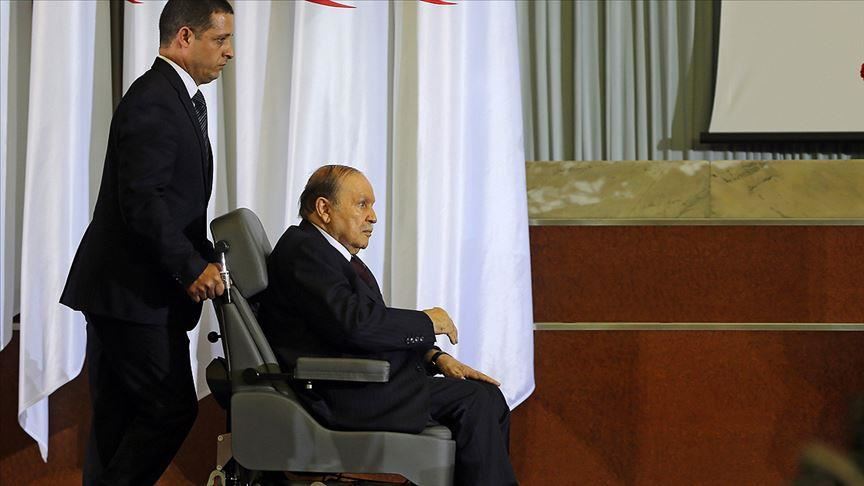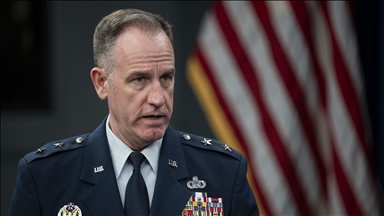
ANKARA
Algerian President Abdelaziz Bouteflika postponed presidential elections after protests and personally withdrew from the race seeking his fifth term in office due to health problems.
Fighting against France during the independence war, Bouteflika was elected for the first time in 1999 and has been ruling the country for four terms.
Although the 82-year-old president has been suffering from a stroke in 2013, he announced his candidacy for a fifth term.
Over the last few weeks, people from various backgrounds took to the streets to protest his decision.
The Algerian regime thought Bouteflika’s candidacy would be detrimental for the future of the regime and Bouteflika withdrew and announced the postponement Monday.
Here are five questions Anadolu Agency took a closer look at in the Algerian elections:
Why were the elections postponed?
While preparing for the elections April 18, everyone in Algeria was curious about Bouteflika’s possible fifth term candidacy due to his health problems.
After the announcement of Bouteflika’s candidacy and support from the regime’s leading parties, people started to take to the streets to protest.
"After the presidential elections, I will immediately ask for a national conference to discuss and adopt political, institutional, economic and social reforms to form the basis of the new reformist system of the Algerian national state,” said Bouteflika and declared his candidacy March 3.
That followed an increasing number of protesters from all backgrounds, and security forces did not use excessive force against protesters.
“I do understand the motivations of the numerous compatriots who choose this way of expression of which I once again hail the peaceful nature,” he said.
“There will be no fifth term and there has never been any question for me, since my health condition and my age assign me as an ultimate duty, to the Algerian people,” he announced and promised extensive change.
What were the demands of the protesters?
Rather than overthrowing the regime, as it happened in other countries during the Arab Spring, Algerians demanded a “change.”
They wanted someone new to rule the country instead of one suffering from health problems.
Their demands also included putting an end to
How did the army respond to the events?
Army Chief of Staff Ahmed Kayed Saleh spoke about the current situation in the country in a speech he gave at the military academy last week.
General Saleh stated that the army would maintain its commitment to the country’s security and stability, and added that “doubtful calls” on “regulating the democracy” were being made by foreign sources.
He denied claims of a coup by the army.
A meeting between Bouteflika and Saleh following the president’s decision Monday was observed as a sign of approval by the army.
How did the opposition react to Bouteflika’s announcement?
While Algerians celebrated Bouteflika’s withdrawal, the opposition was cautious regarding his announcement.
The opposition termed the withdrawal as “half victory” and defended that it was against the Constitution for Bouteflika to extend his presidency.
Some presidential candidates said the postponement was a “clear attack on the Constitution” and extending his time in the office was a “fait accomoli legitimacy.”
Former Prime Minister Ali Benflis said that it was against the Constitution to extend the time of
Former Communication Minister Abdulaziz Rahabi pointed out that Bouteflika was no longer a candidate but would continue his duty as president after April 2019.
Meanwhile, many activists demanded protests to realize reforms and maintain pressure on the administration.
What will happen in Algeria now?
Bouteflika announced his withdrawal from the upcoming presidential election, however, he continues to hold his post.
It is also said that the former Prime Minister Ahmed Ouyahia handed his resignation and Bouteflika appointed Noureddine
A draft constitution prepared by the conference would be voted in a referendum.
Steps taken by the administration calmed down protesters, however, the nature of reforms or a date for the next elections is not declared.
*Writing by Busra Nur Bilgic and Sena Guler
Anadolu Agency website contains only a portion of the news stories offered to subscribers in the AA News Broadcasting System (HAS), and in summarized form. Please contact us for subscription options.


